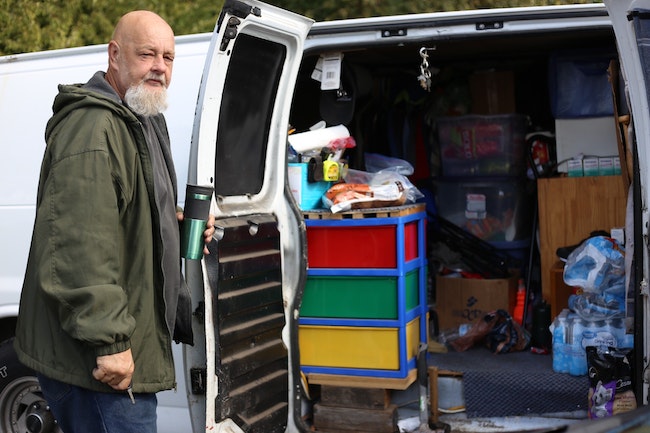 Doug Pendleton, a former resident of Cascades Gateway Park, pictured in September, shows the inside of the van he lives in. Pendleton said he’d use a car camping program if Salem enacts one. (Troy Brynelson/Salem Reporter)
Doug Pendleton, a former resident of Cascades Gateway Park, pictured in September, shows the inside of the van he lives in. Pendleton said he’d use a car camping program if Salem enacts one. (Troy Brynelson/Salem Reporter)
Doug Pendleton was woken Monday at 7 a.m. and drove to the Walmart parking lot to wait out the darkness. Then he spent his day parked at a city park.
The 64-year-old lives in a white, 1999 GMC Safari. For years he’s lived off $780-a-month social security checks, which he splits on necessities — like food and propane gas — and keeping the van humming. To him, it’s a cheap, mobile apartment.
“You just don’t have enough to rent a place,” he said. “They want three times the amount! When you don’t get three times the amount, how are you going to rent?”
It’s unclear how many of Marion and Polk counties’ 1,800 homeless residents live in cars, trucks or RVs, but the city of Salem is working to organize car camping to make it easier for those people to rest for the night.
Salem City Council on Monday night will hear a report from city staff about best practices around the region. The report recommends several standards — which can be read here — but not whether the city should do it.
Councilor Chris Hoy, who asked staff last month to develop the report, was hopeful.
“This is something, hopefully, that won’t cost a ton of money for the city,” he said. He said it was one part of a multilayered approach.
Organizing car camping would be the city’s latest initiative to address homelessness. Last month Salem officials banned public camping, which then pushed people who lived in tents toward downtown to sleep under business’ awnings and overhangs. The city then deemed those sidewalks a health hazard to be closed and cleaned.
Nonprofit leaders and city officials have tried to open a low-barrier, seven-nights-a-week shelter for those displaced by the camping ban. At least 10 buildings have been looked at, but no deal struck.
Organizing car camping won’t solve homelessness, said Councilor Tom Andersen, but it can help.
“I would say in general, car camping is another tool in the toolbox we can use to help to have some alleviation of the problems,” he said.
People who live out of their vehicles often have different problems than those who sleep in tents, according to homeless services providers. They are often people who recently lost their residence but continue to hold a job. They are not at as high a risk as people who live in tents.
“As far as safety and security, there’s an added benefit to being able to stay in your vehicle,” said Stephen Goins, director of transitional programs at Northwest Human Services. “You have the ability to go where you need to go.”
For Pendleton, living out of a vehicle has meant skipping showers and cooking meals on a camp stove. He uses a fridge or television when he can tap electricity.
“It’s not so bad if you don’t have to shower and you’ve got a little stove you can cook with,” the Salem native said.
Pendleton said he became homeless two years ago and has lived out of the van since. He lived at Cascades Gateway Park until the city in September cracked down on overnight parking. He served time in jail before that, he said.
His most recent job was mowing lawns, he said, but he’s battled a back injury for years.
“You find a job, then your back screws up, then you end up losing the job,” he said.
He said his days are predictable. He can often watch a 12 volt television and, if weather allows, he takes his dog for walks and cleans his van. But the nights are harder to plan.
“It’s kind of a bummer. You’re just trying to figure out where you’re going to park and not be messed with,” he said. In the past that has meant parking behind laundromats or restaurants until his van’s noticed, restarting the search. “Next thing, you’ll have a security guard knock on your van saying ‘You gotta go.’”
Recently he reconnected with an old friend who’s offered his driveway, he said. He also knows one business and a church that let him park overnight, but he’s got to be off the property by 7 a.m. By mid-morning he parked at Cascades Gateway Park. City parks open from sunrise to sunset.
Vehicle camping currently, according to the city, risks hurting property and become a health and safety issue.
But the report, authored by Salem’s code enforcement officer Brady Rogers, said organized car camping, “subject to reasonable limitations, may provide a more suitable option for campers, protect health and safety, and reduce negative impacts on neighboring properties.”
Salem staff looked at Eugene’s approach, which opens sites from 9 p.m. to 7 a.m.
In Eugene, businesses, religious institutions and public entities can open their lots to a maximum of six vehicles, according to the report. A vehicle is defined as a “a car, tent, camper, trailer or Conestoga hut.” Eugene also allows single-family residences, with some restrictions, to offer their backyards or driveways.
Eugene also pays a nonprofit to oversee a slew of city-approved places that also have portable restrooms and trash service.
In Rogers’ report, he noted Salem doesn’t have staff or funding to have city-approved sites.
When asked if he’d embrace a car camping program set up in Salem, Pendleton said yes.
“I would, if they’d do it,” he said. “Oh yeah. A lot of people would.”
Have a tip? Contact reporter Troy Brynelson at 503-575-9930, [email protected] or @TroyWB.










